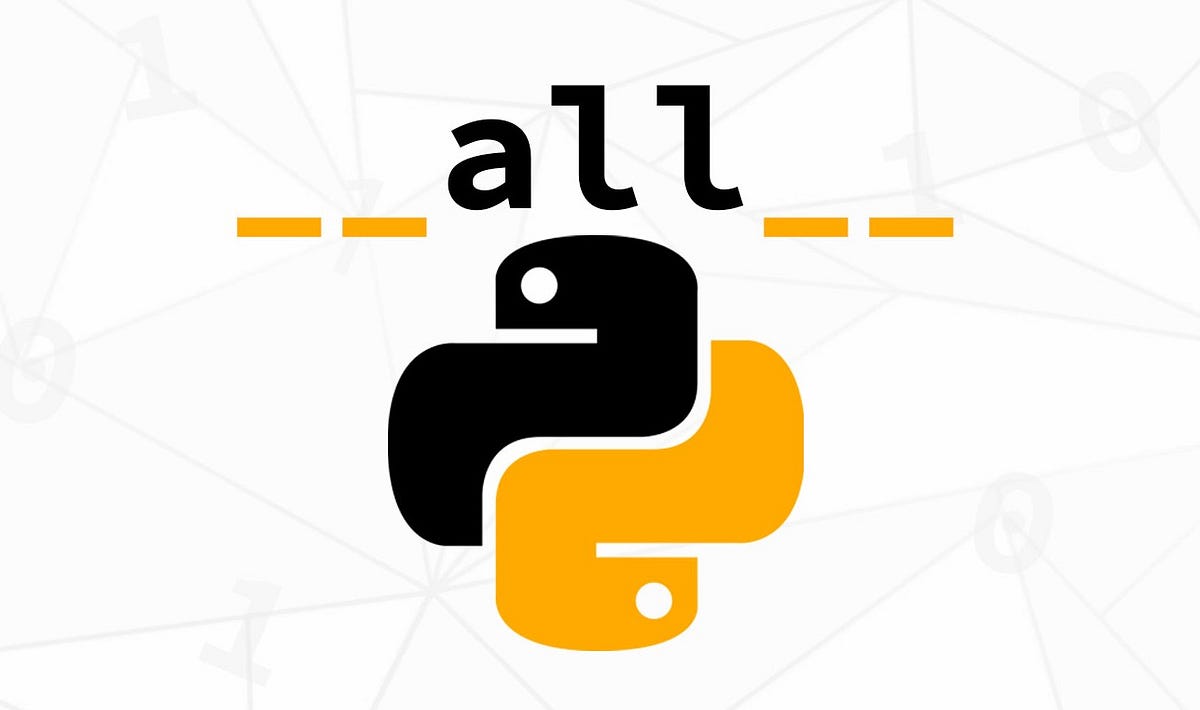Understanding Python's __all__ Variable
Learn how Python's __all__ attribute controls module imports and ensures clean namespaces for your projects.
Learn how Python's __all__ attribute controls module imports and ensures clean namespaces for your projects.
When working with modules in Python, you might encounter the special variable __all__. This variable plays a crucial role in managing what gets imported when someone uses the from my_module import * statement. Let's explore how __all__ acts as a gatekeeper for your module's contents and why it's considered a good practice, especially for larger projects.
In Python, __all__ is a special variable that you can use inside a module (a .py file). It helps you control what gets imported when someone uses the from my_module import * statement.
Think of __all__ as a gatekeeper for your module. It's a list, and inside this list, you put the names of the things (like functions, classes, or variables) that you want other people to be able to import when they use from my_module import *.
Here's how it works:
Without __all__: If you don't have an __all__ defined in your module, and someone uses from my_module import *, Python will try to import everything from your module. This can sometimes lead to unexpected behavior, especially if your module has a lot of stuff in it.
With __all__: When you define __all__ in your module, you're explicitly telling Python: "These are the only things I want people to be able to import using from my_module import *."
Example:
Let's say you have a module called my_module.py with the following code:
def public_function():
print("This is a public function.")
def _private_function():
print("This is a private function.")
__all__ = ["public_function"] Now, if someone tries to import everything using:
from my_module import *They will only be able to access public_function. Trying to use _private_function will result in an error.
Key Points:
__all__ is just a regular Python list containing strings.__all__ should match the names of the things you want to export.__all__ is a good practice, especially for larger modules, as it makes your code clearer and helps prevent accidental imports.__all__, you can still import specific things directly using from my_module import public_function.In essence, __all__ gives you more control over the public interface of your Python modules, making your code more organized and predictable.
This Python code defines a module "my_module.py" with two functions: "greet" and "_calculate_age". The "greet" function takes a name as input and prints a greeting message. The "_calculate_age" function is an internal helper function that calculates age based on the birth year. The "all" variable specifies that only the "greet" function should be imported when using "from my_module import *". This ensures that the "_calculate_age" function remains private and not accessible outside the module.
# my_module.py
def greet(name):
"""Greets the person passed in as a parameter.
This function is designed to be part of the public interface of this module.
"""
print(f"Hello, {name}!")
def _calculate_age(birth_year):
"""Calculates age based on the given birth year.
This is an internal helper function and not meant to be used directly
outside of this module.
"""
from datetime import datetime
current_year = datetime.now().year
return current_year - birth_year
# Define what gets exported when using 'from my_module import *'
__all__ = ["greet"] Explanation:
greet(name): A public function intended to be used by others._calculate_age(birth_year): An internal helper function, prefixed with an underscore (_) to signal it's not meant for direct external use.__all__ = ["greet"]: This line is crucial! It explicitly lists "greet" as the only thing that should be imported when someone uses from my_module import *.How to use it:
# another_file.py
from my_module import *
greet("Alice") # This will work fine
# _calculate_age(1990) # This will raise an AttributeError Key takeaways:
__all__ variable acts as a filter for from module import * imports.__all__ improves code readability and prevents potential naming conflicts.Great notes! Here are some additional points to consider, expanding on the provided information:
Why avoid from my_module import * altogether?
from my_module import specific_function) make it crystal clear where functions/classes are coming from. This greatly improves code readability and maintainability.Alternatives and Best Practices:
from my_module import public_function, AnotherPublicClassfrom my_module import public_function as pf, AnotherPublicClass as APCimport my_module
my_module.public_function() When __all__ is particularly useful:
__all__ helps define a clear and controlled public API.__all__ acts as documentation, explicitly showing what's meant for external use.Important Considerations:
__all__: You can programmatically build the __all__ list if you need to control exports based on conditions or configurations.__all__ Doesn't Hide: While it restricts from ... import *, users can still directly import names not in __all__ if they know the internal structure of your module. It's primarily about defining a public interface, not enforcing strict privacy.Remember, using __all__ thoughtfully, along with other best practices for imports, will make your Python code more robust, maintainable, and easier for others (and your future self) to understand.
The __all__ variable in Python modules acts as a gatekeeper, dictating what gets imported when using from my_module import *.
Here's a breakdown:
| Feature | Description |
|---|---|
| Purpose | Controls which module members are imported with from my_module import *. |
| Type | A list of strings. |
| Content | Names of functions, classes, or variables to be publicly accessible. |
Behavior without __all__
|
Imports all module members, potentially causing conflicts or unexpected behavior. |
Behavior with __all__
|
Only imports members listed in __all__. |
| Benefits | Improves code clarity, prevents accidental imports, and defines a clear public interface for your module. |
Example:
In a module my_module.py:
__all__ = ["public_function"]
def public_function():
# ...
def _private_function():
# ...Using from my_module import * will only import public_function.
Key Takeaway:
Using __all__, especially in larger modules, is a good practice for creating organized and predictable code by explicitly defining the public interface of your modules.
In conclusion, the __all__ variable in Python provides a powerful mechanism to control the public interface of your modules. By explicitly listing the names of functions, classes, and variables you want to expose, you enhance code organization, prevent accidental imports, and make your modules more predictable for users. While from module import * can be convenient, it's generally recommended to import specific items or the entire module for greater clarity and to avoid potential namespace conflicts. Employing __all__ effectively, especially when designing larger projects or libraries, contributes significantly to building robust and maintainable Python code.
 Python all - GeeksforGeeks | A Computer Science portal for geeks. It contains well written, well thought and well explained computer science and programming articles, quizzes and practice/competitive programming/company interview Questions.
Python all - GeeksforGeeks | A Computer Science portal for geeks. It contains well written, well thought and well explained computer science and programming articles, quizzes and practice/competitive programming/company interview Questions. Usage of all in init.py - Python discussion | Hello, I notice that some projects make use of the all member in the init.py file to declare members that are part of the public API of a package. I am wondering if this can be compared to module exports in JavaScript, for example. And, if yes, if it would be a good thing if an inspection tool might show warnings whenever a client uses a member which is not listed in all? Bye, Jo
Usage of all in init.py - Python discussion | Hello, I notice that some projects make use of the all member in the init.py file to declare members that are part of the public API of a package. I am wondering if this can be compared to module exports in JavaScript, for example. And, if yes, if it would be a good thing if an inspection tool might show warnings whenever a client uses a member which is not listed in all? Bye, Jo What does all mean in Python? | The modules use the all variable to specify symbols considered as part of the module's public interface when using the from module import * statement.
What does all mean in Python? | The modules use the all variable to specify symbols considered as part of the module's public interface when using the from module import * statement. Python's all: Packages, Modules, and Wildcard Imports – Real ... | In this tutorial, you'll learn about wildcard imports and the all variable in Python. With all, you can prepare your packages and modules for wildcard imports, which are a quick way to import everything.
Python's all: Packages, Modules, and Wildcard Imports – Real ... | In this tutorial, you'll learn about wildcard imports and the all variable in Python. With all, you can prepare your packages and modules for wildcard imports, which are a quick way to import everything. 6. Modules — Python 3.12.7 documentation | If you quit from the Python interpreter and enter it again, the definitions you have made (functions and variables) are lost. Therefore, if you want to write a somewhat longer program, you are bett...
6. Modules — Python 3.12.7 documentation | If you quit from the Python interpreter and enter it again, the definitions you have made (functions and variables) are lost. Therefore, if you want to write a somewhat longer program, you are bett... Demystifying all in Python: A Closer Look at Module Exports ... | Title: Demystifying all in Python: A Closer Look at Module Exports
Demystifying all in Python: A Closer Look at Module Exports ... | Title: Demystifying all in Python: A Closer Look at Module Exports The Meaning of Underscores in Python – dbader.org | The various meanings and naming conventions around single and double underscores (“dunder”) in Python, how name mangling works and how it affects your own Python classes.
The Meaning of Underscores in Python – dbader.org | The various meanings and naming conventions around single and double underscores (“dunder”) in Python, how name mangling works and how it affects your own Python classes.